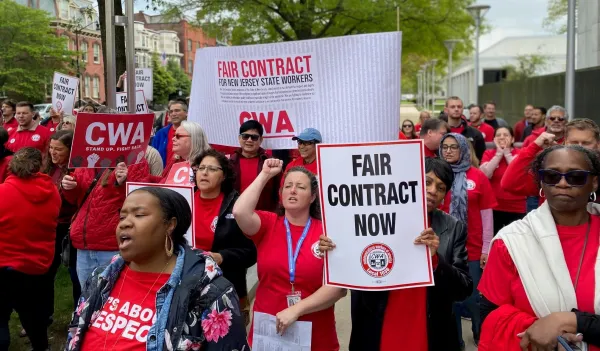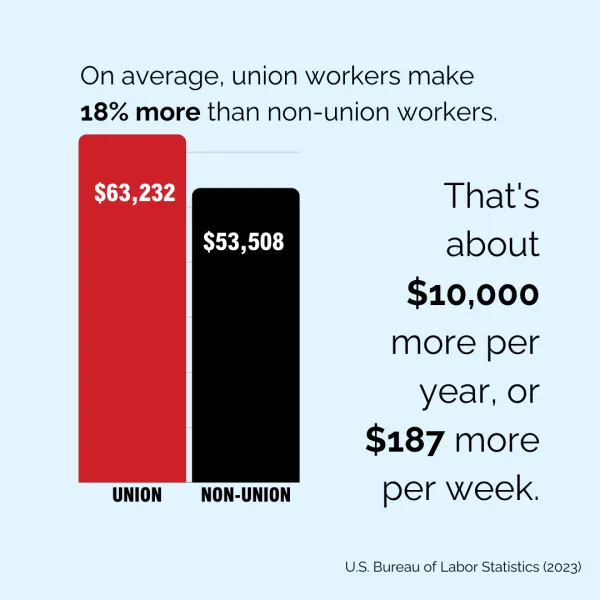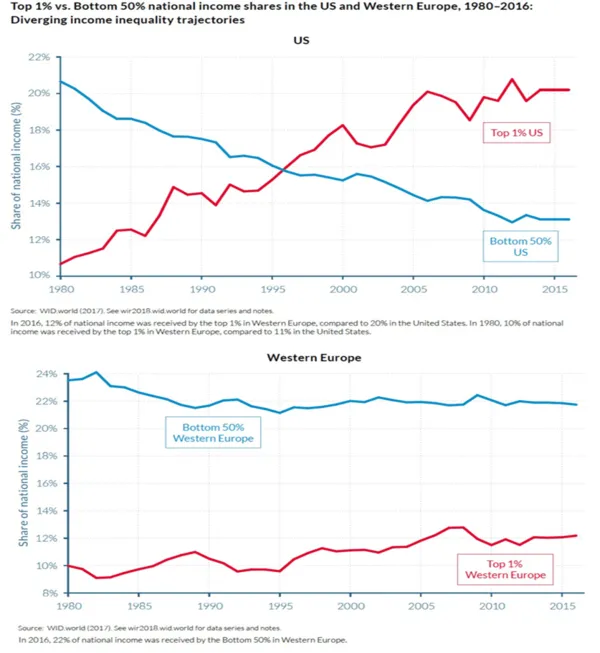The Union Difference
Joining the Union is one of the most important decisions you will make in your career, and while you will never hear us say not to join the Union, we would be remiss if we did not tell you why having and joining our Union makes a difference.

Why should I have to pay dues?
The most fundamental principle of a Union is strength in numbers. Alone, we beg our employers for better pay and benefits. Together, we negotiate and leverage our power in numbers to demand and win improvements to our working conditions. Dues work under the same principle. Because all of us chip in a small amount of money from our paychecks, we are able to shoulder the costs of representation, such as paying for mediation, arbitration, having professional staff that can represent us during these hearings, having an office space, and being able to support organizing efforts of other workers in the Local and around the nation. Together we afford the tools we need to fight against workplace injustices.
While everyone in the bargaining unit is covered by our contract, our Union offers a number of exclusive benefits only to those who sign a membership card and join our Union. Only Union members enjoy full representation for grievance, disciplines, mediation, and arbitration. Because a majority of members pay a small percentage in dues, we can shoulder the costs for these expensive hearings without asking members to pay anything out-of-pocket. Non-members on the other hand, will be charged for the costs of representation and arbitration. This can be upwards of $5,000 per arbitration session. While it might be hard to imagine needing to take a matter to arbitration, if your job is ever on the line or a particular matter requires you to grieve a workplace injustice, not having to shoulder the costs of representation and arbitration will ultimately help you as you move through your career.
Our Union only charges 1.15% of base pay in dues. Our dues rate is set by members and has been the same since CWA began representing public sector workers in the state of NJ in the 1970s. Only members can vote to change the dues rate at a General Membership meeting.
What happens when I join the union?

Joining the union means being in solidarity with your coworkers, and it means having exclusive access to some of the fruits of that solidarity. Unionized workers have higher pay, better access to healthcare and retirement options, and greater job security on average. Only members can receive bargaining updates, complete bargaining surveys, and participate in union events such as worksite meetings and general membership meetings. Additionally, only members get to vote to approve or reject the contract, the Local’s yearly budget, and to elect their Local representatives or run for an elected position themselves. Lastly, only members receive constant communications and updates on important union news, such as the bargaining process and changes in legislation that directly affect every worker. Members not only receive these updates but are also invited to attend special lunch-and-learn meetings where we thoroughly explain and discuss topics like how to apply for FMLA, what the promotional process looks like, or what to expect during contract negotiations.
Assistance with non-contractual matters is a benefit only offered to union members. Desk audits, CSC appeals, discrimination complaints, filing for the Public Service Loan Forgiveness Program, and other document review all fall under the guise of non-contractual matters for which members receive close assistance in drafting and filing.
Your membership is also your access to a variety of exclusive discounts and benefits. The Local offers multiple scholarships per year, for members and their children pursuing higher education or attending a technical school, and for members saddled with student loan debt looking for repayment assistance. Due to our membership in Labor Councils throughout the State of NJ, we also have access to a number of Labor Council scholarships as well. Your membership also provides you with access to two websites called Union Plus and Buyers Edge, where you and your family are eligible for discounts on anything from purchasing a vehicle and vision insurance to travel discounts and pet insurance. Union Plus also offers additional educational scholarships and the ability to obtain an online degree at a very affordable price. We offer discounted rates for life insurance and disability insurance through American Income Life Insurance and Aflac, as well as discounted legal services with Pellettieri, Rabstein, and Altman, including 2 hours of free consultation per year on any legal matter. Finally, we offer discounted movie tickets to AMC and Regal.
What's the bigger picture?
While your membership provides you with access to all the benefits above, it is also the only way to help build your Union and the labor movement. Our current wages and benefits are a direct result of us collectively bargaining with our employer. They were not provided by the employer out of kindness, but because we flexed our power through direct actions. Becoming a member helps us build on previous victories, which ultimately results in a better and more productive work environment for all.

Beyond securing previous victories and improving our workplace, becoming a member of the Union will help our nation reverse the worrying trend of sky-rocketing income wealth inequality. The United States is one of the few countries in the Western world that has a low union density of only 10.3% in comparison to others such as the United Kingdom, Germany, Italy, Sweden, and Denmark. What does that mean? It means that out of our entire workforce of 167.1 million people, which is larger than all the above countries’ entire workforces combined, only 17.3 million workers have a union, and only 14.3 million of that 17.3 million joined their Union. How does our country’s low union density impact wealth inequality? By having such a low rate of workers organized and protected by a Union contract, employers in the United States have been able to demand more from us, while withholding the profits from those of us who actually do the work. This impacts everything from our ability to afford healthcare, food, housing, education, to having the collective power to demand changes in our political system for a more equitable distribution of wealth. Joining our Union is the first step to drawing a line in the sand against the spoilers of our rights to a living wage, housing, healthcare, a habitable planet, education, and an inclusive society. Participating in our Union is how we make these demands a reality.
